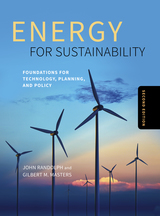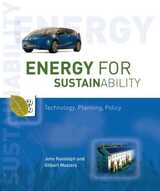2 books about Energy for Sustainability

Energy for Sustainability, Second Edition
Foundations for Technology, Planning, and Policy
John Randolph and Gilbert M. Masters
Island Press, 2018
Despite a 2016-18 glut in fossil fuel markets and decade-low fuel prices, the global transformation to sustainable energy is happening. Our ongoing energy challenges and solutions are complex and multidimensional, involving science, technology, design, economics, finance, planning, policy, politics, and social movements.
The most comprehensive book on this topic, Energy for Sustainability has been the go-to resource for courses. This new edition has been thoroughly revised and updated to inform and guide students and practitioners who will steer this transformation.
Drawing on a combined 80 years of teaching experience, John Randolph and Gilbert Masters take a holistic and interdisciplinary approach. Energy for Sustainability can help techies and policymakers alike understand the mechanisms required to enable conversion to energy that is clean, affordable, and secure. Major revisions to this edition reflect the current changes in technology and energy use and focus on new analyses, data, and methods necessary to understand and actively participate in the transition to sustainable energy.
The book begins with energy literacy, including patterns and trends, before covering the fundamentals of energy related to physics, engineering, and economics. The next parts explore energy technologies and opportunities in three important energy sectors: buildings, electricity, and transportation. The final section focuses on policy and planning, presenting the critical role of public policy and consumer and investor choice in transforming energy markets to greater sustainability. Throughout the book, methods for energy and economic analysis and design give readers a quantitative appreciation for and understanding of energy systems. The book uses case studies extensively to demonstrate current experience and illustrate possibilities.
Students will gain an understanding of what it takes to achieve clean, affordable, sustainable energy. Supplemental materials are available at www.islandpress.org/energy
The most comprehensive book on this topic, Energy for Sustainability has been the go-to resource for courses. This new edition has been thoroughly revised and updated to inform and guide students and practitioners who will steer this transformation.
Drawing on a combined 80 years of teaching experience, John Randolph and Gilbert Masters take a holistic and interdisciplinary approach. Energy for Sustainability can help techies and policymakers alike understand the mechanisms required to enable conversion to energy that is clean, affordable, and secure. Major revisions to this edition reflect the current changes in technology and energy use and focus on new analyses, data, and methods necessary to understand and actively participate in the transition to sustainable energy.
The book begins with energy literacy, including patterns and trends, before covering the fundamentals of energy related to physics, engineering, and economics. The next parts explore energy technologies and opportunities in three important energy sectors: buildings, electricity, and transportation. The final section focuses on policy and planning, presenting the critical role of public policy and consumer and investor choice in transforming energy markets to greater sustainability. Throughout the book, methods for energy and economic analysis and design give readers a quantitative appreciation for and understanding of energy systems. The book uses case studies extensively to demonstrate current experience and illustrate possibilities.
Students will gain an understanding of what it takes to achieve clean, affordable, sustainable energy. Supplemental materials are available at www.islandpress.org/energy
[more]

Energy for Sustainability
Technology, Planning, Policy
John Randolph and Gilbert M. Masters
Island Press, 2008
Energy for Sustainability is the first undergraduate textbook on renewable energy and energy efficiency with a unique focus on the community scale. Written by two of the foremost experts in the field, it is a pedagogically complete treatment of energy sources and uses. It examines the full range of issues—from generating technologies to land use planning—in making the transition to sustainable energy.
The book begins by providing a historical perspective on energy use by human civilizations and then covers energy fundamentals and trends; buildings and energy; sustainable electricity; sustainable transportation and land use; and energy policy and planning. Included in these topical areas are in-depth discussions of all of the most promising sources of renewable energy, including solar photovoltaic systems, wind turbines, and biofuels. In addition, the authors offer a thorough presentation of “green” building design, the impact of land use and transportation patterns on energy use, and the policies needed to transform energy markets at the local, state, and national levels. Throughout, the authors first provide the necessary theory and then demonstrate how it can be applied, utilizing cutting-edge practices and technologies, and the most current available data.
Since the dawn of the industrial age, the explosive growth in economic productivity has been fueled by oil, coal, and natural gas. World energy use nearly doubled between 1975 and 2005. China’s energy use has been doubling every decade. The implications for the environment are staggering. One way or another, our reliance on fossil fuels will have to end. Energy for Sustainability evaluates the alternatives and helps students understand how, with good planning and policy decisions, renewable energy and efficiency can support world demands at costs we can afford—economically, environmentally, and socially.
The book begins by providing a historical perspective on energy use by human civilizations and then covers energy fundamentals and trends; buildings and energy; sustainable electricity; sustainable transportation and land use; and energy policy and planning. Included in these topical areas are in-depth discussions of all of the most promising sources of renewable energy, including solar photovoltaic systems, wind turbines, and biofuels. In addition, the authors offer a thorough presentation of “green” building design, the impact of land use and transportation patterns on energy use, and the policies needed to transform energy markets at the local, state, and national levels. Throughout, the authors first provide the necessary theory and then demonstrate how it can be applied, utilizing cutting-edge practices and technologies, and the most current available data.
Since the dawn of the industrial age, the explosive growth in economic productivity has been fueled by oil, coal, and natural gas. World energy use nearly doubled between 1975 and 2005. China’s energy use has been doubling every decade. The implications for the environment are staggering. One way or another, our reliance on fossil fuels will have to end. Energy for Sustainability evaluates the alternatives and helps students understand how, with good planning and policy decisions, renewable energy and efficiency can support world demands at costs we can afford—economically, environmentally, and socially.
[more]
READERS
Browse our collection.
PUBLISHERS
See BiblioVault's publisher services.
STUDENT SERVICES
Files for college accessibility offices.
UChicago Accessibility Resources
home | accessibility | search | about | contact us
BiblioVault ® 2001 - 2024
The University of Chicago Press









